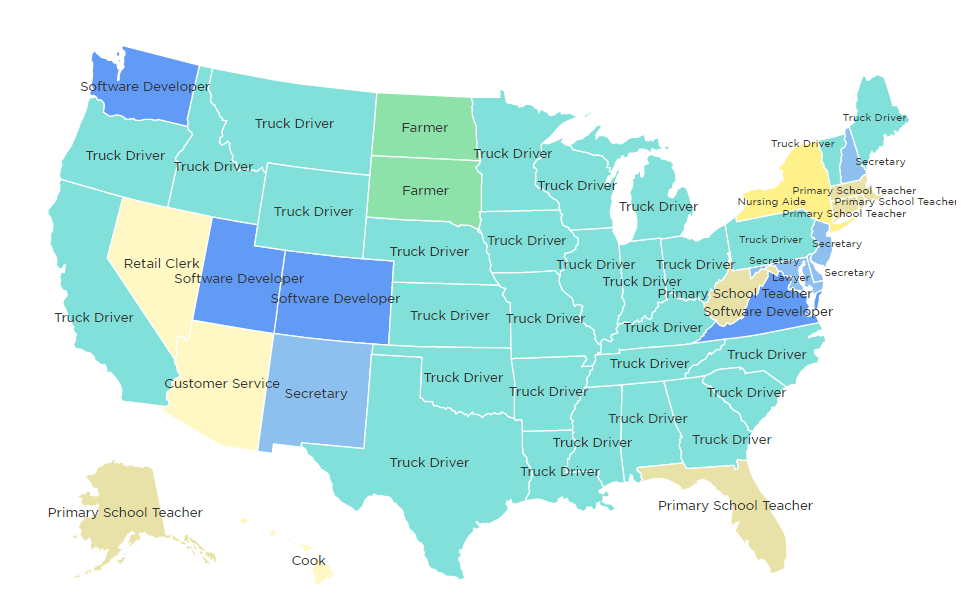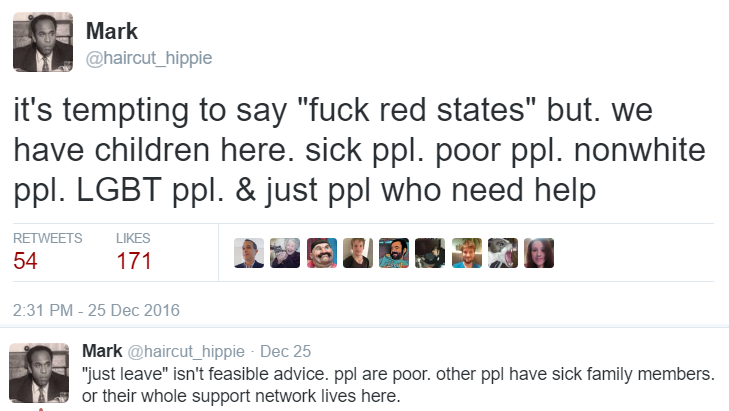In a recent Rob Bell podcast, the motivational speaker and former pastor discussed how people seek simplicity in uncertain times. Post-election, I even found myself reflexively demonizing, or over-simplifying, the opposition. The fact is that the country after the election isn't suddenly different than the one we had before.
'So much of what liberals fight for is that people shouldn't be judged as "monoliths,"... defining Trump supporters by the worst of his rhetoric is ignorant.'
There is absolutely no place for homophobic, misogynistic, racist, fascist, anti-Semitic, anti-Muslim, or anti-science sentiment in our government, presidential or otherwise. Referring to neo-Nazis as the "alt right" is a dangerous normalization. The continual stream of confusing, even contradictory, statements is less a sign of befuddlement and more a page out of the authoritarian playbook. The handful of people that seek to embolden and enrich their own diminutive agendas born of fear and ignorance will be, eventually, defeated. Period.
But what about the tens of millions of others? Who are those people that voted for Trump not because of his rhetoric, but despite it? What kind of pain exists that makes embracing a monster more desirable than continuing to endure? How badly does a system have to fail for someone that "blowing it up" seems a logical step?
I grew up on an Indian reservation, rural places long known to be economically challenged. If I skim the list of lowest-income places in the United States I see familiar names. I can't justify Trump or his actions. But I can empathize with a rural America that has seen far too many of its basic social systems (social, economic, governmental, etc.) strip mined and abandoned in the name of progress.
We talk about the "Rust Belt": the areas of declining industrial production slowly turning fallow before a changing world economy. But at least those places have the dignity of a moniker. Much of America - the America that elected Trump - does not. This is the America where their youth leave; either migrating to cities due to lack of opportunity at home or joining the military. They leave behind a diminished, aging population that puts even greater strain on the remaining community fabric.
Those that stay face suicide rates in rural areas are double those in urban areas. Their infrastructure is crumbling. They watch heroin use rise in their communities. That is when they're not suffering from crystal meth or prescription pill related crime.
When jobs do come, they often are at the behest of vast, international conglomerates more interesting in extracting what value there is left, rather than building sustaining economic engines. In his book, Throwing Rocks at the Google Bus, media theorist Douglas Rushkoff articulates how Walmart, through low prices, paradoxically bankrupts communities over the course of decades:
"So now Walmart is in trouble, because so many small towns where it operates are impoverished. Once you have a Walmart, you can't make any money doing anything else. Everyone just either works for the Walmart or buys from the Walmart, that's it. And it's an extractive force, so eventually the towns go belly up, and now there's Walmarts closing because the towns they're operating in have died."
That is the status quo that rural America has been told is the way forward. The future being championed by technology companies also doesn't provide much hope. Automation, not trade, has already claimed manufacturing jobs. The introduction of self-driving, long-haul trucks now threatens to eliminate one of the last remaining middle-class occupations that didn't require a degree. Simply retraining isn't the answer, either, as many rural Americans live in "Education Deserts".
Who is employed as a trucker? Besides several of my family members, quite a few of red state Americans:

Modern America has left part of itself behind. It is exactly this kind of status quo - the kind that only extracts without replacing with an alternative, that champions the disruption of livelihoods without transition to replacements, that "hollows out" health and home to enrich elites in far flung places - that has simmered resentment and anger. There are horrible people who took glee in a Trump victory. Then there where the millions that want - need - something different.

"But who gives a shit about some backwater?"
Unfortunately, I see this sentiment all too often. Richard Florida, an American urban theorist, has long argued that knowledge economies favor urban rather than rural areas. In a recent piece, he argued that our economic vitality required ceding nation state power to cities. Rather than using government power to create opportunity, as co-ops are doing with New-Deal regulations to run fiber-optic cable, he'd accelerate these places returning to dust from which they rose.
America is not only a coast. Americans are not just the people who think or look like I do. The American dream is not a system that enriches some while sacrificing others. Red or blue, the audaciousness of our civic experiment is that we are a plurality. After the fascist and nationalistic fervor dissipates, we then begin the hard job: reclaiming an America system that works for all of us, not some of us. Avoiding another protest vote capable of electing the next Trump depends on it.


